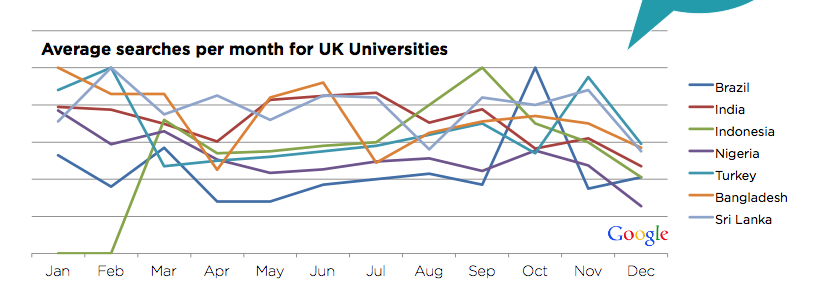Google search data from leading student source countries reveals that university searches peak at different times throughout the year in each country.
News and business analysis for Professionals in International Education
Have some pie!
Google data reveals peak search times, most searched-for universities

The data, compiled in a whitepaper by education marketing company Net Natives, highlights the differences in consumer habits and when university education is at the front of students’ minds.
The release follows Google search data recently released by the BBC revealing the world’s most searched-for universities.
The company complied data on the average searches per month for UK universities in 2013 from users in Brazil, India, Indonesia, Nigeria, Turkey, Bangladesh and Sri Lanka.
The company attributed high traffic from Indonesia, Brazil, Turkey, India and Sri Lanka in September to the release of world university rankings
Peak times were found to align with newsworthy events in the education sector including university rankings or changes in student mobility patterns.
Average searches from students in India for example peaked in November around the release of video produced in collaboration with the British Council and Universities UK to encourage talented Indian students to study in the UK.
According to the company a peak in searches from Turkey in November coincided with US data released showing US universities saw a record number of foreign students.
Meanwhile the company attributed high traffic from Indonesia, Brazil, Turkey, India and Sri Lanka in September to the release of world university rankings underlining the influence rankings hold in these markets.
“What’s interesting here is that the QS world rankings in September consistently generate interest but the THE world rankings have less of an impact internationally,” commented Kailan D’Arcy, Marketing Manager at Net Natives.
The data reflects searches for UK universities however D’Arcy pointed out that it’s more reflective of the habits of students from source countries than the UK as a destination.
“If we’re seeing trends in searching for UK universities then I’d be surprised if people were searching for UK universities one month and then US universities in a completely different month,” he said.
The company gained access to the search data as part of the Trusted Google Partner scheme.
The results follow similar data released by Google and the BBC recently which reveal the most popular university searches of people around the world.
The results reflect a hierarchy different from traditional third party rankings with US-based University of Phoenix topping the list of most searched-for universities. The Massachusetts Institute of Technology and Open University followed.
Compared to 2011 when the most searched-for universities were traditional campus-based institutions led by Oxford and Cambridge, data from 2014 shows that searches for MOOC platform Coursera has overtaken all UK campus universities.
Many others are outranked by other MOOC providers Futurelearn and edX.
“The internet is playing an ever increasing role in the decision making,” Harry Walker, education industry head at Google to the BBC.
“Students are online searching and consuming content in all forms when they are deciding whether or not to go to university and deciding which universities to apply for.”
“Students are online searching and consuming content in all forms when they are deciding whether or not to go to university”
In its whitepaper, Netnatives also provides marketing insight for institutions looking to recruit from MINT– Mexico, Indonesia, Nigeria and Turkey– countries.
Mexican students were found to be particularly interested in student life and attracted by the experience at a specific university or city.
The company reported that Indonesian students are concerned with credit transferability upon return home and foreign educators should clearly clearly communicate any internationally recognised qualifications they have in the areas of quality of teaching, awards or rankings.
Meanwhile, career progression upon returning home is a top priority for Nigerian students who are increasingly able and willing to travel for study objectives as the middle class becomes more affluent.
Former Goldman Sachs economist Jim O’Neill popularised the term BRICS and last year coined MINT as another acronym for emerging countries to watch. D’Arcy confirmed that among NetNatives clients there has been an increased focus on MINT countries this year but not at the cost of BRICS nations.
“We’ve run campaigns this year for 29 different countries so our clients aren’t solely focused on MINT or BRIC countries.”
Still looking? Find by category:



11 Responses to Google data reveals peak search times, most searched-for universities